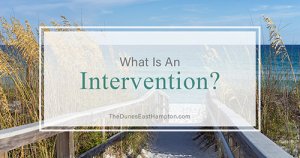To kickstart the recovery process, an intervention may be necessary. What is an intervention, exactly? An intervention is a chance to show loved ones that treatment is critical for their health and happiness. Professional support during an intervention can make the process simpler, safer and more successful.
What is an Intervention?

The goal of an intervention is not to make the person with an addiction feel bad, sad or angry. The goal is to help him or her get professional treatment. Often, people struggling with drug or alcohol abuse want to justify their behavior. They don’t want to confront the reality of their dependencies.
An intervention can be challenging, and it will be emotional for just about everyone involved. However, all the effort is worth it if the person begins a detox or rehab program.
When is an Intervention the Right Choice?
An intervention won’t always work. If a person is hostile or very ill, for example, an intervention could make the situation worse. An intervention shouldn’t happen if it’s thrown together at the last minute, either. In order to be successful, friends and family members need to plan it out in advance.
Individuals should also never plan an intervention in conjunction with other events. Often, people try to stage an intervention during a family reunion, funeral or birthday party. This isn’t a good idea, and it detracts from the whole process.
An intervention may be the right choice if multiple family members have concerns about a loved one’s substance abuse. It’s also the right choice when that person is reluctant to get help or thinks that he or she can handle recovery alone.
How Can an Interventionist Help?
Sometimes, the best way to handle interventions is to let a professional guide the way. An interventionist is a specialist who can be a neutral third party. The interventionist won’t be emotionally tied to the outcome, so he or she can act logically and professionally.
An interventionist can also prepare people for what to expect. He or she can suggest phrasing or words that are more likely to break through to the individual you’re holding the intervention for. He or she can also react in real time and make sure the intervention stays on track.
What Comes After the Intervention is Complete?
After the intervention, it’s time for treatment. At The Dunes of East Hampton, residents can enjoy luxury and comfort during recovery. Medical attention, privacy and upscale amenities are offered in addition to all of the following:
- Cognitive and dialectical behavioral therapy
- Family therapy
- Group therapy
- Experiential therapy
- Holistic approaches like massage and yoga
An intervention can be the catalyst for a new and sober way of life. At The Dunes of East Hampton in New York, residents can begin their lives of recovery. Call 877-818-5539 to learn more about intervention support, recovery programs and how to take back control over your life. What is an intervention going to do for your loved one?







